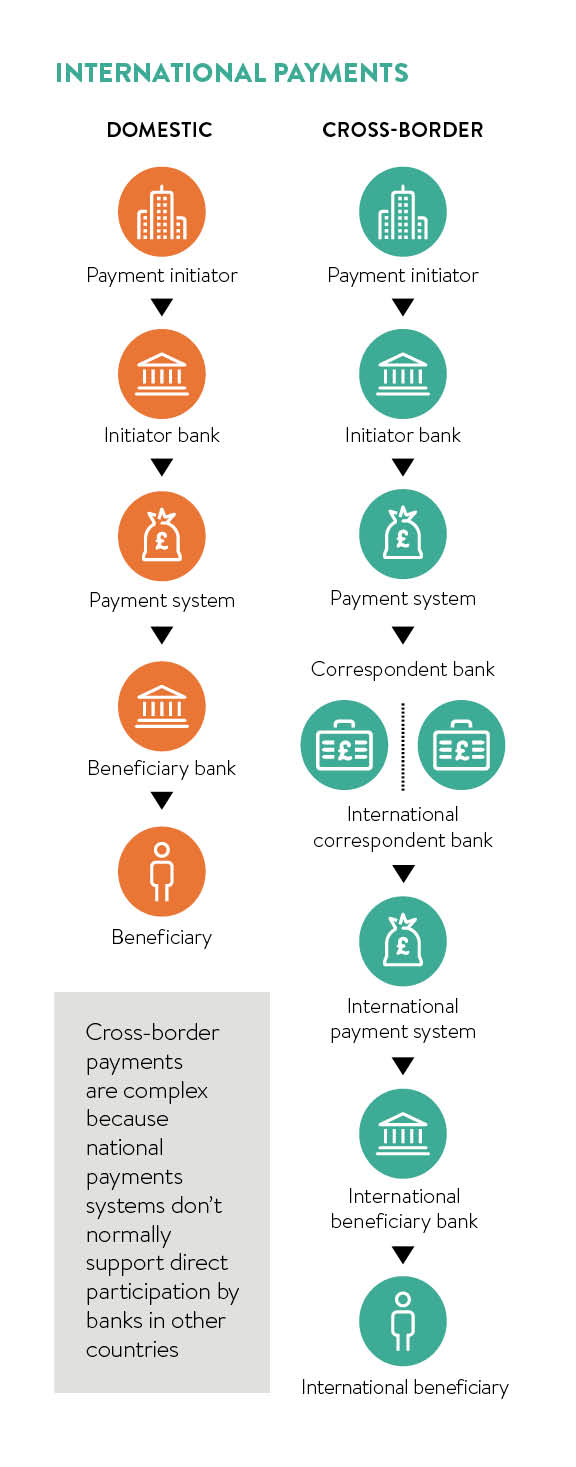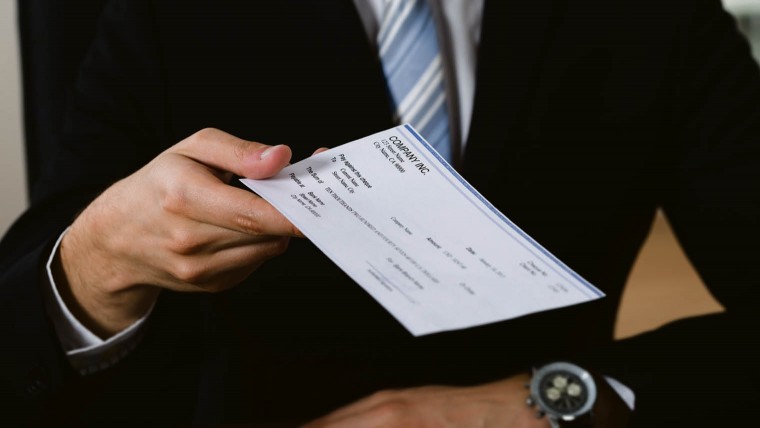Fuelled by advances in digital technology, cross-border payments have become faster, cheaper, safer and easier to fulfil. The world is in the middle of a technological boom and payments, spurred on by dramatic advances in financial technology, are leading the charge.
It all started in the 1980s with a spike in foreign property investments; it gathered momentum with the spread of internet connections, then mobile phones. Today market access is easy and a sector once dominated by global financial titans is now filling up with new players from outside traditional banking circles.
These are a broad range of companies located around the world. They are technology startups, global retail firms and everything in-between and they are providing a burgeoning assortment of different services to suit all customers.
Andy Brown, operations director of Equiniti International Payments, says: “These services were historically available from banks; however, the overseas property booms of the 80s introduced a need for international currency movements between legal practices and highlighted the market opportunity for money services business to provide these services.
“Technology has supported the entry of new providers into this traditional banking market, which has resulted in much more competition from non-banking organisations, driving down the cost of payments. These changes, coupled with the continuing growth of globalisation, have hugely increased both the size of the international payments market and the different providers in this market space.”
Harper Reed is the co-founder of payments company Modest, which he sold to PayPal in 2015. Now head of commerce at Braintree, he is an avid observer of digital trends in the payment space. The explosion of mobile phone use around the world is cause for great excitement, he argues.
“Half of the world’s population now has a mobile. Around 40 per cent of the world has an internet connection. In 1995 it was less than 1 per cent. By 2020, another 3 billion will have access to the internet – another three billion able to join the global marketplace – that is huge,” says Mr Reed.
“Alongside this, people have become so much more comfortable with online purchases and invisible payment authentication in commerce experiences. With mobile, these seamless purchase experiences are becoming a normal part of our lives.”
Technology has proliferated, but crucially it has also standardised, allowing systems in different geographies to work symbiotically. For example, common messaging protocols developed in the last ten years have smoothed the path, says Andrew Neeson, market intelligence manager at VocaLink.
“The European Union’s SEPA [Single Euro Payments Area] initiatives along with the adoption of ISO 20022 messaging standards means that messages accompanying payments are standardised. However, the real advance will come from a global faster payments system and already the US, Singapore and UK are operating on fundamentally similar faster payments networks,” he says.
Meanwhile, emerging security systems are underpinning the spread of global virtual currencies such as bitcoin as well as payment platforms including SEPA, says Neville Lacey, UK and Europe head of UKForex.
This spread of technology is opening up the world economy and creating opportunities to make money and improve lives simultaneously
“Blockchain [a ledger of cryptocurrency transactions] is the latest technology to emerge in this space and has amazing capability in terms of tracking data records. It could also help make bitcoin a legitimate currency,” he explains.
“Same-day SEPA payment now means that cheaper and faster payments to Europe will be available to everyone very soon, while mobile wallets will see payments made through mobiles more commonplace. Apple Pay is leading the way in this area.
“Additionally, PSD2 [revised Directive on Payment Services] will see EU payment companies forced to up their security for customers, with two-factor authentication potentially becoming mandatory.”
The internet has broken down historical payment boundaries and has granted people access to financial services where doors were once closed. This spread of technology is opening up the world economy and creating opportunities to make money and improve lives simultaneously.
The growth of the market has multiple benefits for developing economies as well as businesses in developed ones with big ambitions. The globalisation of payments and reduced costs makes exporting a much more palatable option for all.
Businesses are keener to experiment in new markets, bringing with them jobs as well as new products and services, and creating a toehold for firms to develop.
E-payments and small businesses
“Now that payments can be made almost anywhere at any time, businesses of all shapes and sizes have a better chance of successfully expanding globally,” says Venugopal Pappu Subrahmanya Venkata, senior manager for banking advisory at Capgemini.
“Small businesses in particular now have the opportunity to be better enabled to grow to a global scale through improved payment options. Businesses also benefit from low-cost remittances, which means that payments, smaller in size, but greater in number, can be made,” he says.
Guillaume Pousaz, founder of Checkout.com, a platform offering international payment options for merchants, says the biggest beneficiaries are small businesses in countries where the banking system is underdeveloped or insecure.
“The biggest impact of new and alternative payments is in countries where there is an unbanked population. New and alternative payment methods are allowing them to shop online and across borders,” he says.
“It has also lowered the set-up costs of businesses, meaning smaller businesses from developing countries can compete with more established businesses from Europe and North America.”
Export-driven markets are the main beneficiaries, especially those which previously lacked payments infrastructure capable of dealing with external demand. But it’s not just businesses that are benefiting. People in a whole range of different life circumstances are living better lives thanks to the improvements.
“People now require payment in currencies other than their own due to various reasons, including working overseas, travelling on a gap year, parents needing to provide funds, work placements and choosing to retire overseas – the requirements of each beneficiary are far-reaching,” says Equiniti International Payments’ Mr Brown.
Losers of the global payment race
But with all these winners there will inevitably be a few losers in the global payments race. Technology is redoubling so quickly that even the fastest startups can quickly become old news the moment another even newer startup invents something better.
Businesses outside the payments industry will have to adapt too. They must accept a greatly expanded field of global competitors, where only a few years ago competition was more predictable, localised and controllable.
“With the pace being set now, more merchants risk losing out if they can’t match their competitors’ offering or their customers’ expectations,” says Mr Pousaz.
But there are other considerations, says Mr Neeson at VocaLink. “Some of these payment systems have limitations; electronic money services based on pre-paid accounts aren’t operated by banks and may be excluded from clearing systems. Bridging between bank-operated and non-bank-operated systems may be crucial to long-term success,” he says.
“A drawback to pre-paid accounts, which are common in developing countries, is that users find it hard to move on from them. Countries are looking at structural solutions, such as Nigeria’s attempts to build a service providing access to bank accounts backed by central account money. This will enable further innovation and a platform upon which services can be built.
“Another drawback with regard to electronic payments is issues to do with indebtedness. Malaysia has had to restrict credit and bring in additional rules due to worries that people were becoming overindebted due to credit cards.”
CASE STUDY: BRAZIL
In Latin America, about half the adult population has access to a bank account. According to Simon Black, chief executive of electronic payment specialist PPRO Group, the invention of cash-based online payment systems, such as Boleto Bancario in Brazil and Oxxo in Mexico, has opened up the region to online trade.
This has proved a significant boost to the regional economy and persuaded many foreign businesses to start trading in the new payment structures. If you want to sell in Brazil, for example, you need to accept Boleto.
The platform gives merchants access to a large chunk of Brazil’s e-commerce sector. More than 36 million Brazilians purchased products over the internet last year at a value of $37 billion, making it Latin America’s biggest market for e-commerce.
“Boleto has rapidly become the second most popular payment method in Brazil and accounts for 24 per cent of all online purchases. So while Brazil presents an opportunity to sell to 200 million consumers, accepting Boleto is part of the code to cracking that market,” says Guillaume Pousaz, founder and executive chairman of Checkout.com.
“E-commerce merchants offering alternative payment methods, such as Boleto and TEF, are able to then access a particular set of audience unreachable via traditional international credit cards.”
The country has a mature telecoms infrastructure and mobile penetration rates are high. By 2017, it is predicted that half the population will have access to mobile internet via smartphones, meaning mobile payments are increasingly in demand.


